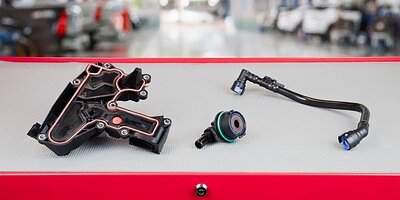
Engine Health Boost: SMP Expands PCV Line to Meet Modern Engine Demands
Standard Motor Products is expanding its Positive Crankcase Ventilation (PCV) program, focusing on Engine Oil Separators (EOS) as direct-injection engines drive demand for improved maintenance and longer component life.
Engine Health Boost: SMP Expands PCV Line to Meet Modern Engine Demands
NEW YORK, NY – November 14, 2025
The Changing Landscape of Engine Maintenance
The automotive industry is undergoing a significant shift in maintenance practices, driven by the prevalence of sophisticated engine technologies like direct fuel injection and turbocharging. These engines, while offering improved performance and efficiency, also present unique challenges regarding blow-by gas management and oil separation. Standard Motor Products (SMP) is responding to this evolving landscape with a strategic expansion of its Positive Crankcase Ventilation (PCV) program, placing particular emphasis on Engine Oil Separators (EOS). The move positions the company to capitalize on a growing market segment fueled by increased demand for preventative maintenance and extended engine life.
“We’re seeing a clear trend,” says one industry analyst. “Modern engines are more efficient, but they also generate more internal pressure and require more robust systems to manage crankcase gases. PCV systems, and specifically EOS, are becoming critical components for maintaining engine health and preventing costly repairs.”
A Deeper Dive into Engine Oil Separation
Engine Oil Separators (EOS) play a vital role in modern engine health by effectively removing oil mist and harmful contaminants from the crankcase ventilation system. Unlike older, simpler PCV valves, EOS are designed to handle the increased demands of direct-injection and turbocharged engines, which tend to generate more blow-by gases. Blow-by refers to combustion gases that leak past the piston rings into the crankcase. These gases, if not properly managed, can lead to oil contamination, reduced engine performance, increased emissions, and ultimately, engine failure.
The functionality of an EOS is crucial for extending engine life. By effectively separating oil mist from the blow-by gases, it prevents the formation of sludge and carbon deposits on critical engine components, such as intake valves and piston rings. This contributes to improved engine efficiency, reduced oil consumption, and longer maintenance intervals. Furthermore, EOS help maintain proper crankcase pressure, preventing oil leaks and ensuring optimal engine sealing.
SMP’s Strategic Expansion and Market Positioning
SMP’s expansion of its PCV program is a strategic response to the growing demand for EOS and the evolving needs of the automotive aftermarket. The company’s new line of PCV components includes Crankcase Breather Hoses, Crankcase Filters, PCV Valves, Engine Oil Separators, and PCV Grommets, providing a comprehensive solution for maintaining PCV system health.
“This isn’t just about adding more parts to our catalog,” explains a source close to SMP. “It's about providing a complete solution for technicians and car owners who are looking to proactively maintain their engines and prevent costly repairs. We’re focused on offering high-quality, reliable components that meet or exceed OEM specifications.”
Industry research confirms the strong growth potential of the PCV market. The global market for PCV valves was estimated at $1.29 billion in 2024 and is projected to reach $2.01 billion by 2033. This growth is driven not only by the increasing prevalence of direct-injection and turbocharged engines but also by the rising awareness among consumers about the importance of preventative maintenance. Another report suggests the automotive PCV valve market will reach $2.5 billion by 2030, showing a robust CAGR of 5.8%. While specific data for EOS growth is less readily available, industry experts agree that this category is experiencing particularly strong demand.
Furthermore, changes in OEM service intervals are contributing to increased demand for PCV components. While historically, PCV valves were often replaced during routine oil changes, some manufacturers are now extending service intervals, requiring more durable and reliable components. This trend is creating opportunities for aftermarket suppliers like SMP to offer high-quality, long-lasting solutions that meet the evolving needs of technicians and car owners.
SMP’s commitment to rigorous testing and OE-matching performance further strengthens its position in the market. The company conducts extensive testing on its PCV components, including accelerated wear, thermal cycling, thermal shock, and vibration testing, to ensure they meet the highest standards of quality and reliability. This dedication to quality, combined with the company’s broad product coverage and strong distribution network, positions it as a key player in the PCV market.
“The aftermarket is becoming increasingly competitive,” notes an industry consultant. “But companies that can demonstrate a commitment to quality, innovation, and customer service will be best positioned to succeed. SMP seems to be taking the right steps to meet those challenges.”
The expansion of SMP’s PCV program is a clear indication of the evolving needs of the automotive industry. As engine technologies continue to advance, the demand for specialized components and preventative maintenance solutions will only continue to grow. By proactively addressing these challenges, SMP is positioning itself as a leader in the PCV market and a trusted partner for technicians and car owners alike.
